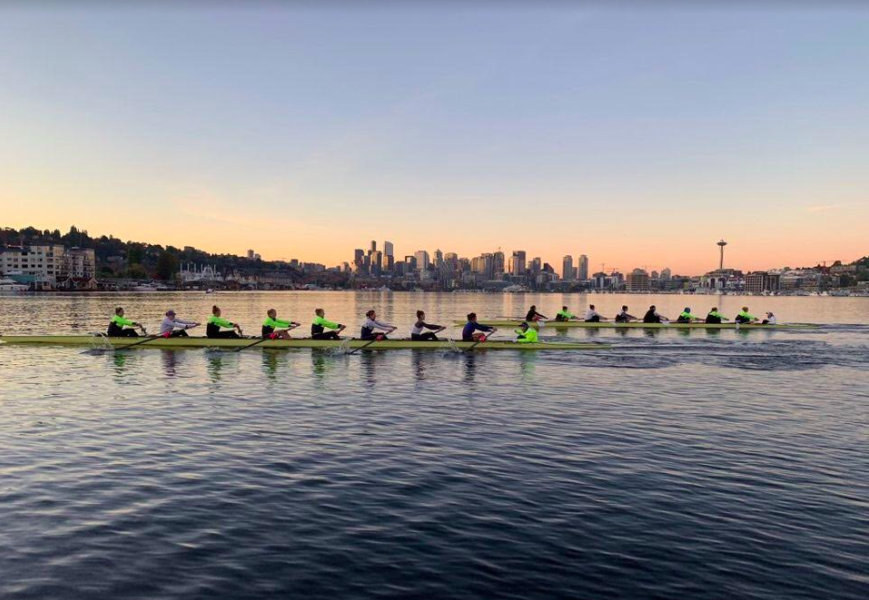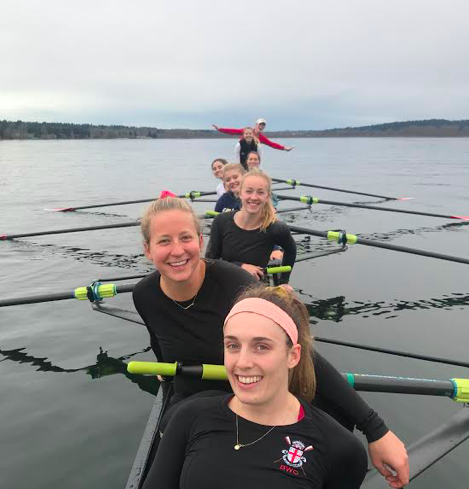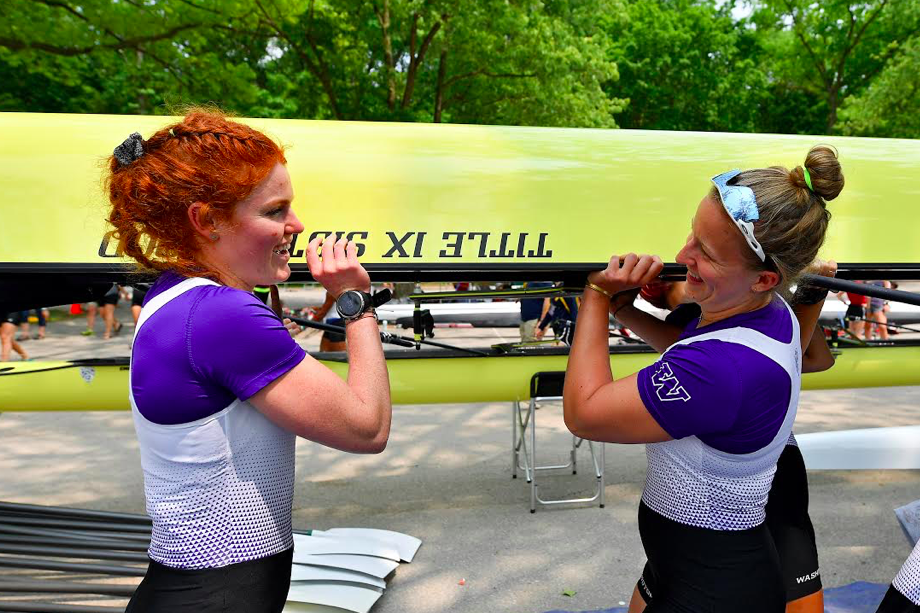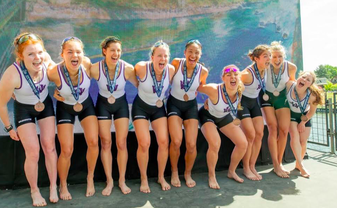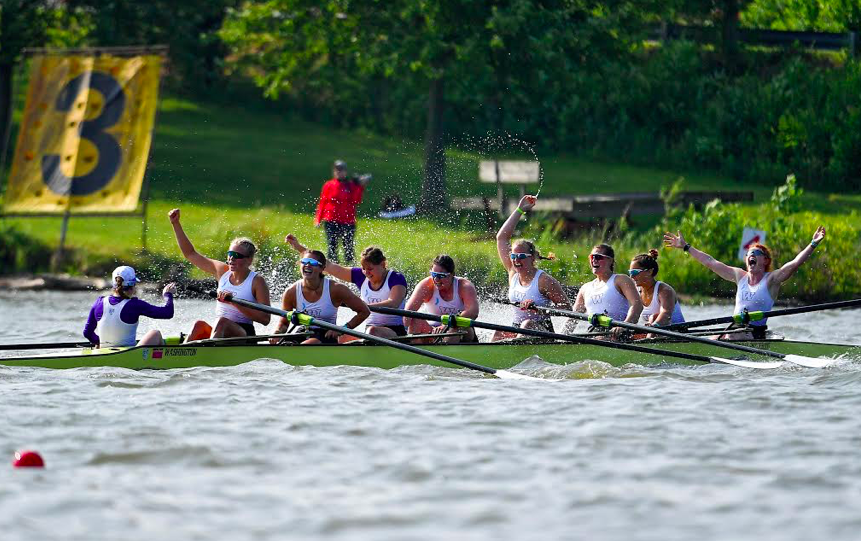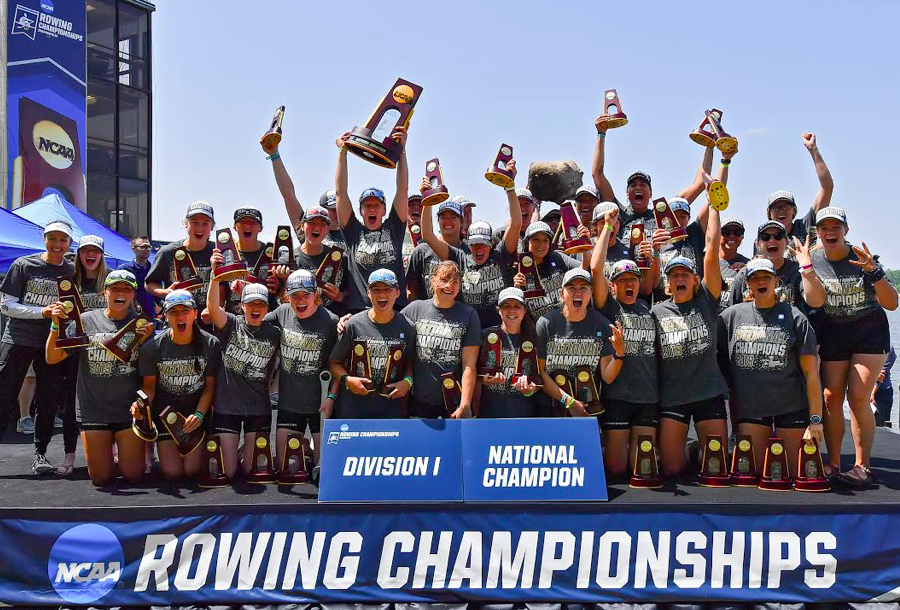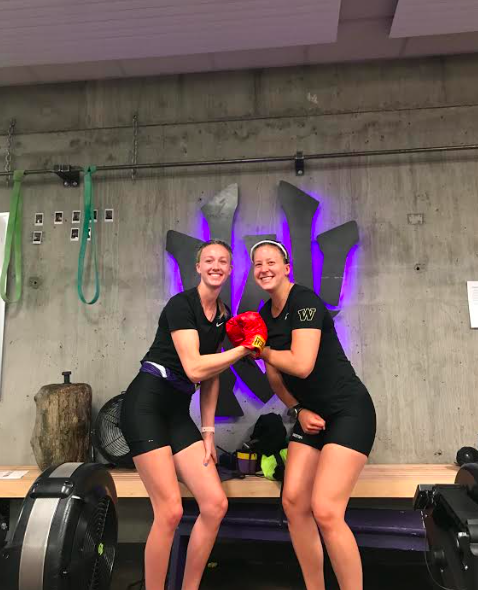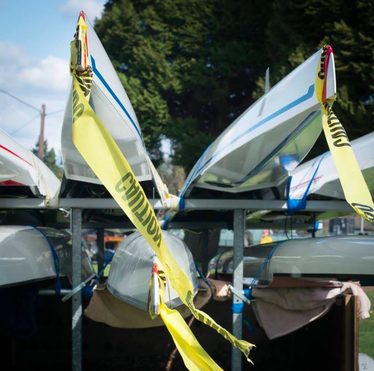 It was the middle of a sweltering hot day in Utah when Steven Freygang, then the Experienced Junior Boys Coach, noticed smoke in the mirror of the passenger side of the trailer. He and Dennis Ferrer were in the midst of driving the Sammamish Rowing Association (SRA) trailer back from Junior Nationals hosted in Florida. SRA had an incredible presence at the regatta. All three boats(Varsity 8, Ltwt. 8, Ltwt. 4) had made the finals and Freygang noted their varsity crew was “off the charts good.” It was an exciting time for Ferrer and Freygang, but that elation was also met with disappointment. During the varsity 8+’s grand final, their cox box failed in the first 500 meters. The crew responded by surging ahead, but soon ran out of gas as their race strategy was lost. They still had an impressive finish, and ended up being the fifth fastest junior men’s varsity 8+ in the country, but they were disappointed when thinking about what could have been if the cox box had not failed. In a hurry to get the trailer back to Sammamish Rowing Association (SRA) in time for Masters Regionals, Ferrer and Freygang missed the opportunity to fully debrief with their athletes after nationals. As they drove towards home with a trailer loaded full of SRA and other Pacific North West team boats, they definitely felt a little low. Then came the smoke from the back of the trailer. Freygang jumped out of the truck and hurried to the back of the trailer. The rear axle was on fire. Grabbing their only water bottle from the truck, he dumped it on the axle to put out the fire. “We stood there and didn’t know what to do,” Freygang said. On the side of the road in the middle of nowhere in blazing heat with no one around, they had no idea what to do next. Their only idea was to call AAA. A representative from AAA came out, took one look at the 20,000 pound trailer and truck, and confirmed their fears that he really couldn’t help. The AAA man stayed with them though as they desperately called local coaches and teams in hopes that someone could help move their boats onto another trailer while they figured out what to do. No one was responding. The AAA employee ended up helping them lift the axel just barely enough with a steel bar, assuring Fregygang and Ferrer that some trailers could be driven on just one axle for a short time. He drove behind the trailer as Freygang and Ferrer drove under ten miles per hour to the closest semi-truck repair shop. They made it and pleaded with the repair shop workers to let them store the trailer there overnight. They agreed to help, and Freygang and Ferrer left the trailer behind as they drove off in the truck in search of a place to stay. Every hotel and available room seemed to be booked except for one honeymoon suite at a local bed and breakfast. They accepted the room which also came with champagne and breakfast in bed. Eventually the two drove home in the truck, leaving the trailer behind in Utah. It wasn’t until a month later that a special ordered part arrived at the semi-truck repair shop, and was used to repair the trailer. Simon Williams drove down to Utah with his wife, picked up the trailer, and SRA’s worst trailer experience was now in the past. Not all trailer driving experiences are this dramatic and full of despair, as Freygang recalled. However, driving a 20,000 pound fully loaded trailer is no easy task. While it doesn’t require a specific license to haul in most states, SRA still requires its coaches to do some training. Matt Lundberg, a seasoned coach and trailer driver at SRA, said, “To be able to drive the trailer you don’t need any sort of professional license. Like with an RV- it’s scary to know not always the most qualified people are driving it. At SRA you go through training that entails being a co-pilot some number of times. After that, when a pilot gives you the go-ahead you are good to drive.” Lundberg has driven the trailer for nearly a decade. He says that a good amount of nerves is always a good thing for trailer drivers to have. It keeps them alert whereas a confident trailer driver may not notice when something is wrong. So what does trailer driving entail? A lot of stops for gas and coffee. Lundberg said, “if your co-pilot drinks coffee you stop for coffee.” While logging a lot of hours on the road isn’t always the most exciting task to take on, Lundberg still enjoys many parts of hauling the trailer. “Going from forests in Washington to mountain to plains and everything else in the other states is really neat. I enjoy seeing the different landscapes. Montana is very diverse going from evergreen forests and mountains to badlands type landscapes.” Time is passed with plenty of music, podcasts, and conversations with you copilot(s). Some of Lundberg’s favorite moments are when they stop for gas, because people always come up and ask about the trailer and boats. He enjoys explaining where he is going and educating people about racing shells. He even once met people from Sammamish, Washington when he was halfway across the country! So far Lundberg has had great success with driving the trailer, and has experienced practically no emergencies. He did however, drive a trailer through a hurricane in Florida, and happened to have the bow of a boat crash through the rear window of the vehicle he was driving at the time. Lundberg wanted all rowers to remember one thing about driving the trailer - boats need to be strapped down tight! “Highway speed is same as hurricane speeds. Strap down boats tightly please!” He said. Over the years Lundberg has had many co-pilots, but he did disclose who his favorite co-pilot of all time was. His wife has been able to accompany him over the years on trailer drives so she was his obvious pick for his favorite co-pilot. When they drive the trailer to San Diego they make a road trip out of it and try to stop at fun spots and overlooks during the journey. Driving the trailer takes a lot of hard work, hours, and thoroughness to ensure successful arrivals and departures. It’s an essential job to ensure we can provide national racing experiences to our members at Sammamish Rowing Association. Even though trailer driving is hard labor - it’s a labor of love. The next time you see the trailer loaded up and ready to go, be sure to give the straps an extra look, and slip a gift-card for coffee into the driver’s seat if you have the chance (or in Lundberg’s case, a PB&J sandwich). 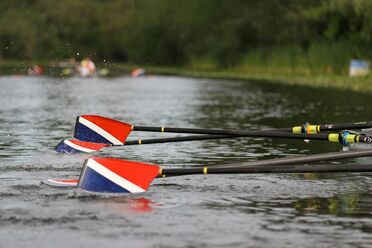 USRowing Nationals took place from July ninth through the fourteenth. The athletes who went had trained for the three weeks prior to the event nearly two times a day. “ We wanted them to experience training at a higher intensity level, and wanted to help them understand the impact of that on their nutrition, sleep and recovery. They also got the opportunity to row in smaller boats (2-, 1x) which is harder to do logistically during the school year,” Eliza Dickson, Sammamish Rowing Association’s Junior Program Director, said. Alec Willett, Ethan Currie, Anna Barry, and Eliza Dickson coached twenty-four junior athletes, who all had to apply for the training camp during their spring season. Coach Dickson said she, “really enjoyed watching the group come together as well as seeing how the athletes took ownership of the experience . Regardless of results, it is also gratifying to watch them learn so much in such a short period of time.” Many of the athletes were seen coming to the boathouse early before many of their double practices to get in extra work. Their dedication to training was remarkable. “They did an amazing job,” Dickson added, “many of our athletes did seven 2k races in three days. That’s like an entire season of spring racing!” Junior rower, Eli Rubenstein, noted how difficult but gratifying the long weeks of training were. He said, “During the weeks of training before USRowing Nationals it was extremely difficult waking up early and practicing in a variety of boats six days a week, which introduced me to a whole new type of training that pushed me to new limits. Alongside the long morning water practices- the land days three days a week were very difficult. With all these practices a lot of food and sleep was needed, but in the end all the hours were worth it.” Many of the rowers had their own reasons for doing the camp, but Rubenstein said, “I decided to do this camp to have an opportunity to get more one on one time with the coaches so I could build relationships with them early on. One of my main goals personally for this camp was to improve my rowing technically so I can have the best chance possible for the upcoming season. This experience helped me as a rower to really advance my rowing to another level, be able to compete against the fastest nationally, and also mentally be able to push myself beyond limits I didn't know existed.” Philip Popa, a junior coxswain of the group, also gave insight on to why he did the camp. “I wanted to gain more racing experience,” he said. “More than that, I also wanted to gain an overall feel for how the experienced boys’ team functions, since I will be joining them in the fall. As far as racing was concerned, I just wanted to place as high as possible, and be able to say after the regatta that we did our best whatever the results ended up being.” Popa and Rubenstein were both on the Junior Boys Novice team last fall and spring and will now be on the Experience Junior Boys team. Even though the training was long, difficult, and tiring, the athletes still had plenty of fun. Rubenstein commented on one of his favorite memories during the trip to Ohio. He said, “One of my favorite moments was the day raced in the Semi-Finals for the U17 4+. Going into this race our whole boat were novices and had the least amount of experience. We were given a speech from Coach Liza and Ethan before our race that opened up our eyes to a whole new world. They told us we were the future of Sammamish [Sammamish Rowing Association], and this race was for us to push our limits more than any other. Our race was the hardest we had ever pushed ourselves and because of that a sense of pride comes to me. Although we didn't qualify for the Grand Finals we did our best and learned a lot along the way.” Whether or not our juniors got a medal- they all came away from USRowing Nationals with successful accomplishments. From pushing their limits, forging new relationships, and discovering their unbounded potential- every junior rower has a reason to be proud of their performance in Ohio. Sammamish Rowing Association did however take home a second place finish in the Women’s U19 2- Final, and second place in the Women’s U19 4- Final. Congratulations to all of our athletes for your amazing growth, development, and success during USRowing Nationals training and the regatta! 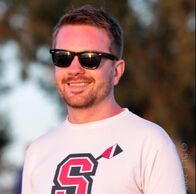 SRA Junior Program Director Eliza Dickson has announced Dennis Ferrer as Head Girls Coach. "The key traits I was looking for during the search were a commitment to developing young people, both in and out of rowing; a commitment to building a full-team culture based on hard work and respect; the ability to work with all coaches on staff in a selfless and positive manner; and a history of success at the regional and national level," said Dickson. "During this process I became more and more confident that the best person for this job was right here in our boathouse." "After working with Dennis over the past year one major thing stood out to me - the care, commitment and passion to give his athletes the best experience possible," Dickson continued. "That is the most important trait that I look for in any coach on our staff. Additionally, Dennis has a history of success coaching Sammamish boats to more than 13 Northwest Regional Championships and qualifying eight boats to USRowing Youth Nationals with four making the grand final – more than any other coach in SRA’s history. These are high achievements for an early coaching career." “I’m humbled and excited by the opportunity to lead this team,” Ferrer said. “I’ve been a part of Sammamish for a long time and am looking forward to continuing to build SRA into the program we all know it can be. There is an incredible group of young women on the team right now and I think we are primed to make some big steps forward.”
Following high school rowing, Gallaher decided to attend the University of Washington (UW). Even before she started rowing, she knew that she wanted to attend UW for academics. After her rowing career started to get serious, she started to consider rowing in college. She got into UW without any help from the rowing team and then began to talk to coaches, and was eventually recruited onto the team. It would turn out that Gallaher would go on to become an incredible collegiate rower. Her list of accomplishments include winning 3 PAC-12 championships, an NCAA championship, and being invited to the US U23 national team selection camp this summer.
Overall, rowing for the Huskies has been a dream come true for Gallaher. “It’s surreal looking back at the time that I didn’t think I was good enough to row for UW,” she said. “I looked up to the older girls on the team my freshman year, and looking where I am now it is honestly a little unbelievable. These past three years have had so many ups and downs, but at the end of the day I feel so lucky and blessed to be where I am. I absolutely love the team.”
Gallaher and other teammates, both men and women, spent time last year writing the grant proposal and ended up receiving one of the largest grant sums from the University’s Sustainability fund. The men’s and women’s rowing teams will each receive an electric motor, and Gallaher and her team are looking for more ways to bring sustainability to the rowing community. Another aspect of their project is outreach. “We had the opportunity to talk at a Sammamish Rowing Association board meeting about our project. Electric launches might not be feasible at the time for all rowing programs, but starting a conversation about environmental sustainability is a great first step. It’s been really cool to be a part of the conversation, and even cooler that SRA was also involved. UW and SRA are both leaders in the northwest rowing community and I’m proud to be associated with both programs,” Gallaher said. Fellow SRA junior rowing alumni, Tennyson Federspiel, helped Gallaher and her project partners present at the Sammamish boathouse. It is special to see our alumni embracing one of the core values of SRA, thoughtful stewardship, beyond their time at the Hod Fowler Boathouse. It just goes to show that we coach not just amazing rowers, but incredible leaders too. Rowing has provided so many opportunities for Gallaher- something she is very aware of. She hopes to give back to the sport she loves, and when asked if she had any advice to offer, she said: “I think if I had advice to give to younger athletes it would be to not set limits for yourself. I realize it’s easy for me to say now that I’m rowing at UW and coming off of a national championship, but there was a time not so long ago that I thought I wasn’t good enough or strong enough to row at UW.” “I am so thankful I had the experience of going through SRA- mainly being introduced to the sport and community at SRA. The support and coaching staff at SRA is so incredible. The community at SRA pushed me to take my rowing career as far as I could.” Gallaher finished with.
Congratulations on your incredible accomplishments, Molly! SRA is so proud of the leader and the person you are now, both in and out of the boat. We can’t wait to see what your senior year of college holds for you! |
Archives
April 2023
Categories
|
|
Sammamish Rowing Association
5022 W. Lake Sammamish Pkwy NE Redmond, WA 98052 [email protected] 425-653-2583 |
Mailing Address:
Sammamish Rowing Association P.O. Box 3309 Redmond, WA 98073 |
|


